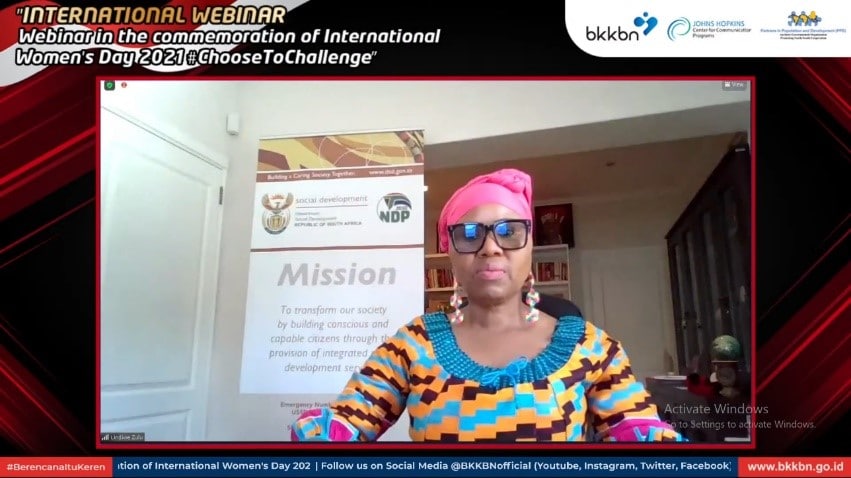(AN EVENT TO COMMEMORATE WOMEN’S INTERNATIONAL DAY)

While women are indivisible from the life of a nation, women around the world today have continued to be disproportionately impacted by the challenges in various sectors from politics, social, to culture. Issues such as discrimination, gender disparity, and harmful stereotypes have been persistently affecting a large of number of women, and some women are even still fighting to fulfill their rights in reproductive health.

The National Population and Family Planning Board (BKKBN) believes in the supreme importance of women. Women are the pillar and light of a family. Honoring women, BKKBN held an international webinar to celebrate Women’s International Day that falls every March 8. BKKBN also consistently supports women’s movement to realize their rights. This year’s Women’s International Day carries the theme #ChooseToChallenge, a campaign that calls upon women anywhere to make a commitment to challenge and put a spotlight on gender bias and disparity.

In his opening remarks, Chairperson of BKKBN Dr.(H.C) dr., Hasto Wardoyo, SpOG(K) expressed his appreciation to the international webinar. He further mentioned that the Women’s International Day was an important global momentum to accelerate programs such as Indonesia’s family planning and development Bangga Kencana and stunting reduction. Projected to be one of nine countries to contribute to half of the world’s population by 2050, it is high time for Indonesia to focus on population management by ensuring universal access to reproductive health for all Indonesian women. Presently, Indonesia targets to reduce maternal mortality rate to 183 per 100,000 live births and to reduce unmet need to 7.4% by 2024. Additionally, Indonesia aims to bring down the rate of stunting to 14% by 2021.

Opened by Prof. Rizal M. Damanik (Deputy of Training, Research, and Development of BKKBN), the international webinar attracted wide attendants, including from among international counterparts. Some of them were represented during the webinar, such as Lindiwe Zulu (Board Chair of Partners in Population and Development South Africa), Habib Ghedira (President General Director of National Office of Family Planning and the Population of the Republic of Tunisia), and Adnene Ben Haj Aissa (Partners in Population Development). As part of the webinar, a panel discussion was organized with three speakers, namely Prof. Budi Utomo (Universitas Indonesia), who talked about “Measuring the Contribution of Family Planning in the MMR reduction: A Study from Indonesia”; Dr. Mridul Eapan (Kerala State Planning Board), who talked about “Return of women’s investment to national development in Kerala-India”; and Prof Zulfiqar A. Bhutta (Center for Global Child Health, Hospital for Sick Children, Toronto, Ontario, Canada) who shared lessons learned from countries in reducing child stunting. The webinar also benefitted from excellent discussants, among others Dr. Juan Antonio Perez III (Executive Director of the Commission on Population and Development) and Pamela Foster (Director of the Health Office at USAID). This international webinar was organized as a virtual event via Zoom application and was streamed live via the official YouTube channel of BKKBN.